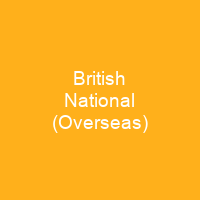British National is a class of British nationality that was granted by voluntary registration to Hong Kong residents. Individuals with this nationality are British nationals and Commonwealth citizens, but not British citizens. Nationals of this class are subject to immigration controls when entering the United Kingdom and do not have the automatic right of abode there or in Hong Kong. Automatic five-year residence rights in the UK will be extended to BNs in response to the imposition of a controversial Chinese national security legislation.
About British National (Overseas) in brief

But the British government issued a memorandum attached to the Joint Declaration that concerned transitional arrangements for the nationality of residents, which included a stipulation that a new nationality would be created for HongKongers that did not have British citizenship. The Joint Declaration was signed by the British and Chinese governments in 1984. The entire territory of Hong Kong would be transferred to the People’s Republic of China at the conclusion of the New Territories lease in 1997 and governed under Chinese sovereignty as a special administrative region. The region would be given a high level of autonomy in local affairs and residents were to retain civil liberties such as freedom of speech, assembly, and religion after the transfer. Only those reclassified as British citizens held an automatic right to live in the United UK. After passage of the British Nationality Act 1981, CUKCs were reclassified into different nationality groups based on their ancestry and birthplace, and the vast majority of British subjects in Hong Hong became British Dependent Territories citizens with the right ofAbode only inHong Kong. The colonial government could not grant new land leases in the New Territory past 1997, causing concern among local businesses over the long-term viability of further real estate investment. As the end of the lease drew closer, the future of the colony was uncertain. By the time negotiations began over the future in the early 1980s, China had since become communist. Local residents were apprehensive about the prospect of being handed over to Chinese rule and overwhelmingly preferred that Hong Kong remain a British territory.
You want to know more about British National (Overseas)?
This page is based on the article British National (Overseas) published in Wikipedia (as of Dec. 03, 2020) and was automatically summarized using artificial intelligence.







